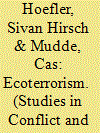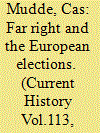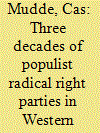|
|
|
Sort Order |
|
|
|
Items / Page
|
|
|
|
|
|
|
| Srl | Item |
| 1 |
ID:
132880


|
|
|
|
|
| Publication |
2014.
|
| Summary/Abstract |
This article examines the phenomenon of "ecoterrorism" from a conceptual and empirical perspective. We explore the political and academic debates over the meaning and use of the term ecoterrorism, and assess the validity of the concept of "ecoterrorism" and of the alleged threat of the Radical Environmentalist and Animal Rights (REAR) movement by analyzing the characteristics of both the movement and its actions. Our analysis shows that the term ecoterrorism should only be used for a small proportion of the actions of REAR movement. Consequently, counterterrorist measures should only target these terrorist minorities, rather than all groups and the broader movement.
|
|
|
|
|
|
|
|
|
|
|
|
|
|
|
|
| 2 |
ID:
148437


|
|
|
|
|
| Summary/Abstract |
The year 2015 was a dreadful one for Europe in general and for the EU in particular. It started with the terrorist attack [2] against the magazine Charlie Hebdo in Paris and ended with an even more deadly jihadist assault [3] in the same city. In between, the EU battled an economic crisis in Greece, which threatened the entire eurozone, and endured a staggering inflow of refugees from the Middle East and other war-torn regions.
|
|
|
|
|
|
|
|
|
|
|
|
|
|
|
|
| 3 |
ID:
129207


|
|
|
|
|
| Publication |
2014.
|
| Summary/Abstract |
If we are to believe the international media, this is going to be the year of the "far right anti-European populists." In the first three days of 2014, The New York Times published two opinion essays warning of the far right's rise, while The Economist focused its first issue of the year on "Europe's Tea Parties." Before this came months of public warnings of a "European populist backlash" issued by prominent European Union politicians, including the presidents of the EU, the European Commission, and the European Parliament (EP), and by national politicians, such as Italian Prime Minister Enrico Letta and Dutch Deputy Prime Minister Lodewijk Asscher. While the warnings have employed different terms and point to somewhat different groups
|
|
|
|
|
|
|
|
|
|
|
|
|
|
|
|
| 4 |
ID:
148122


|
|
|
|
|
| Summary/Abstract |
In a very respectful response—titled with a classic rhetorical question: “Does Canadian Multiculturalism Survive through State Repression?”—Phil Ryan supports most of the arguments that Emma Ambrose and I laid out in our article “Canadian Multiculturalism and the Absence of the Far Right.” However, he does question two particular claims: (1) that the Canadian state represses critique of multiculturalism and (2) that there are no other supply-side factors to explain the absence of the far right in Canada. In this short response, I will argue, first and foremost, that Ryan perceives Canada too much through an exclusively Canadian lens, exaggerating the tolerance of the Canadian state for far-right discourse as well as the criticism of multiculturalism by the Conservative Party of Canada.
|
|
|
|
|
|
|
|
|
|
|
|
|
|
|
|
| 5 |
ID:
120129


|
|
|
|
|
| Publication |
2013.
|
| Summary/Abstract |
The populist radical right constitutes the most successful party family in postwar Western Europe. Many accounts in both academia and the media warn of the growing influence of populist radical right parties (PRRPs), the so-called 'verrechtsing' (or right turn) of European politics, but few provide empirical evidence of it. This lecture provides a first comprehensive analysis of the alleged effects of the populist radical right on the people, parties, policies and polities of Western Europe. The conclusions are sobering. The effects are largely limited to the broader immigration issue, and even here PRRPs should be seen as catalysts rather than initiators, who are neither a necessary nor a sufficient condition for the introduction of stricter immigration policies. The lecture ends by providing various explanations for the limited impact of PRRPs, but it is also argued that populist parties are not destined for success in opposition and failure in government. In fact, there are at least three reasons why PRRPs might increase their impact in the near future: the tabloidisation of political discourse; the aftermath of the economic crisis; and the learning curve of PRRPs. Even in the unlikely event that PRRPs will become major players in West European politics, it is unlikely that this will lead to a fundamental transformation of the political system. PRRPs are not a normal pathology of European democracy, unrelated to its basic values, but a pathological normalcy, which strives for the radicalisation of mainstream values.
|
|
|
|
|
|
|
|
|
|
|
|
|
|
|
|
|
|
|
|
|